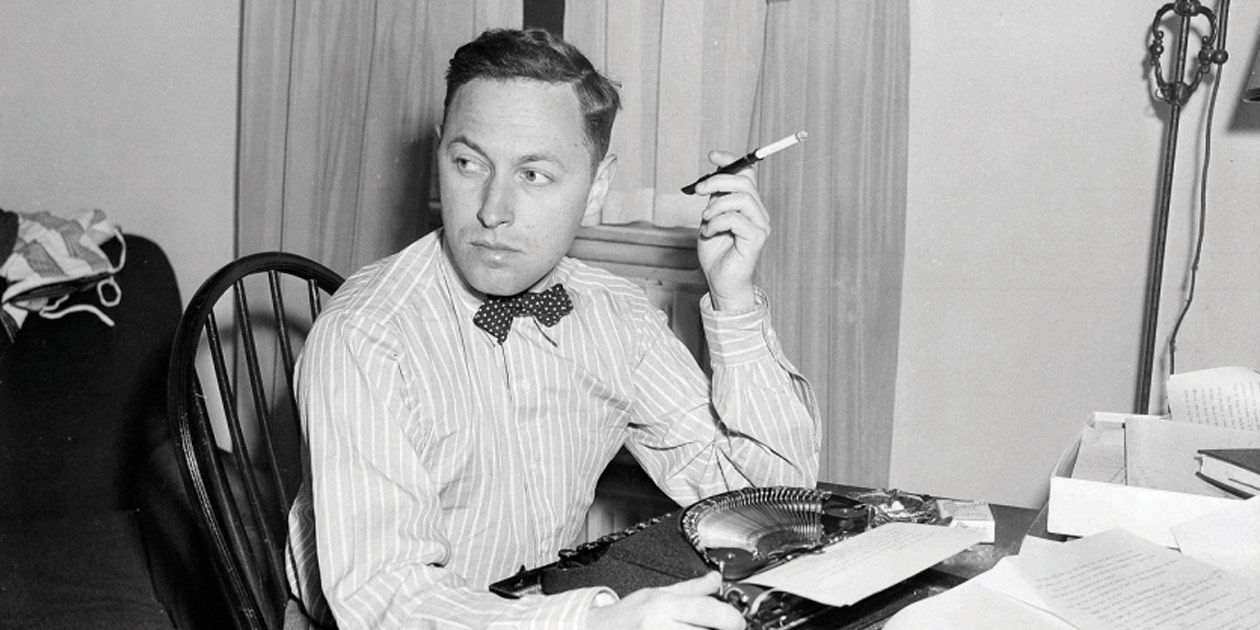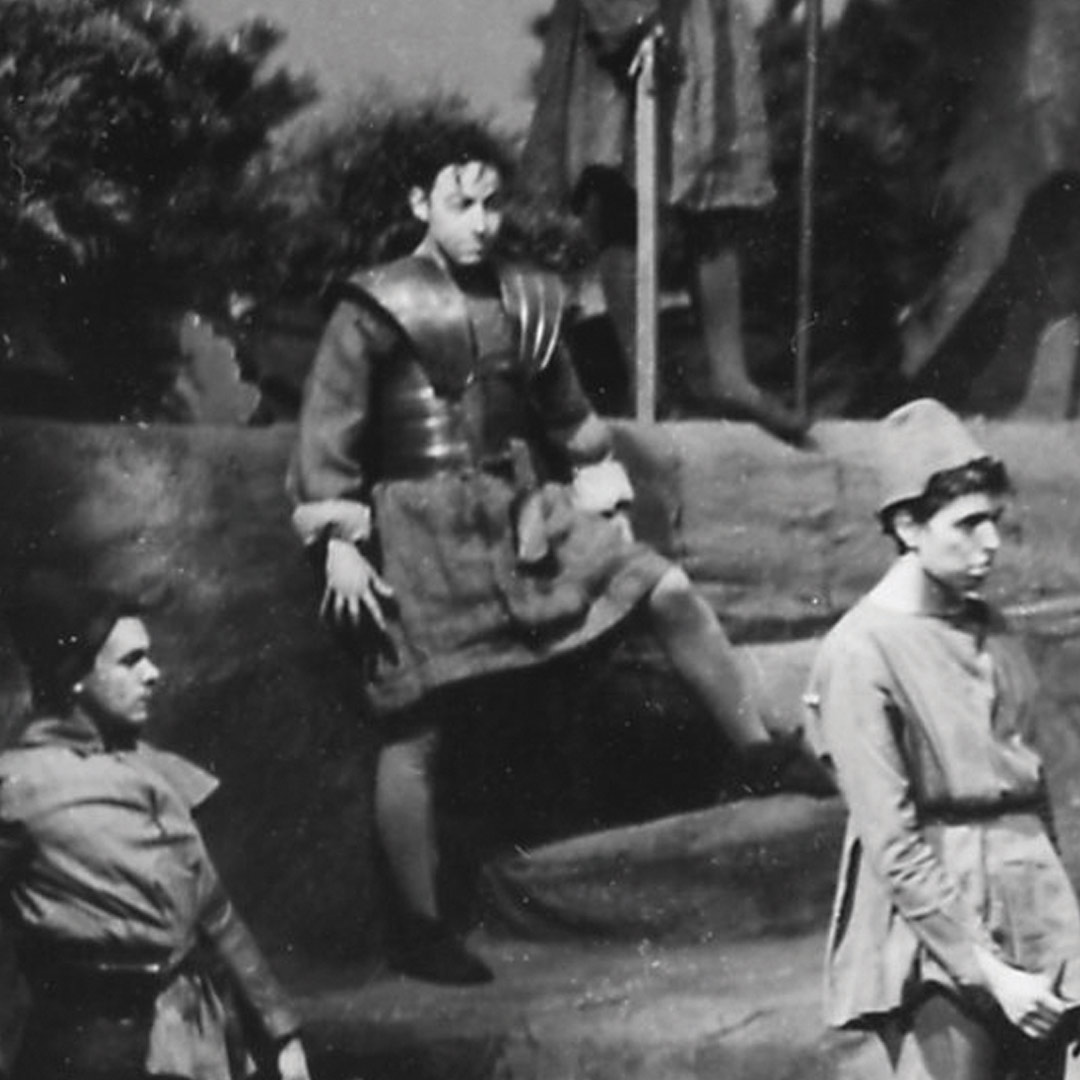Gene Wilder, Tennessee Williams, and a Century of Iowa Drama
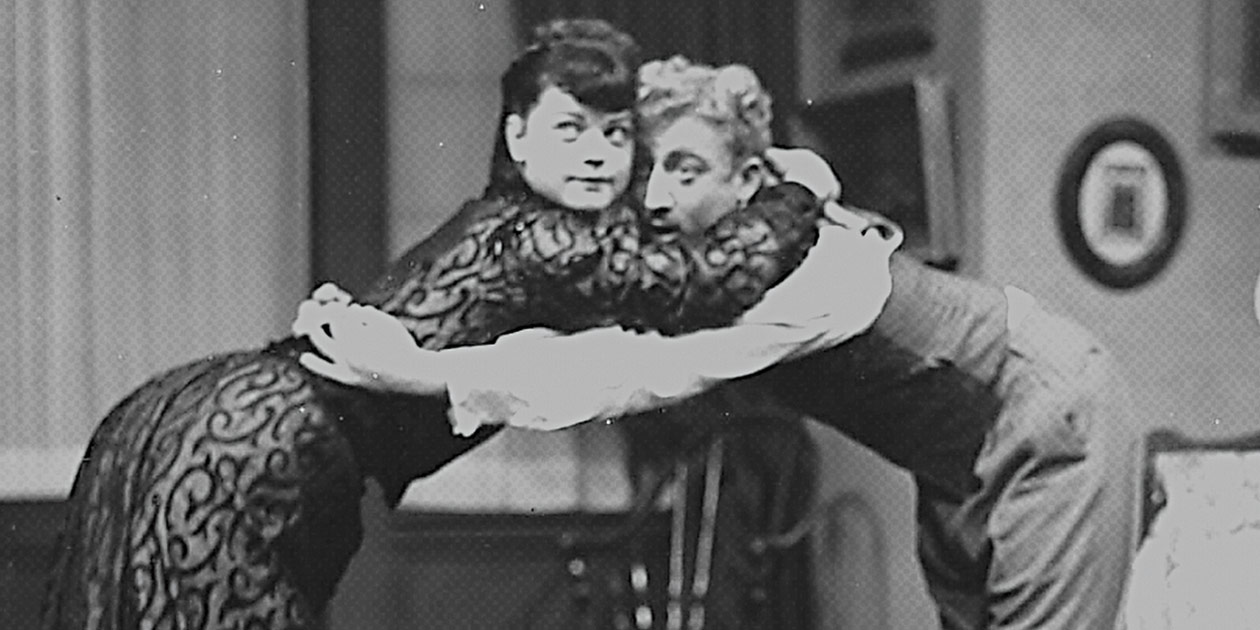 PHOTO: FREDERICK W. KENT COLLECTION OF PHOTOGRAPHS, UI LIBRARIES SPECIAL COLLECTIONS AND UNIVERSITY ARCHIVES
In October 1951,
Gail McClintock and
Jerry Silberman—better known as Gene
Wilder—star in the
UI production of The
Winslow Boy.
PHOTO: FREDERICK W. KENT COLLECTION OF PHOTOGRAPHS, UI LIBRARIES SPECIAL COLLECTIONS AND UNIVERSITY ARCHIVES
In October 1951,
Gail McClintock and
Jerry Silberman—better known as Gene
Wilder—star in the
UI production of The
Winslow Boy.
Gene Wilder (55BA) powdered his face and barreled onto the University of Iowa Theatre Building's main stage. Providing comic relief as Sir Toby Belch in the 1954 production of Shakespeare's Twelfth Night, Wilder felt as though he'd left the bustle of Iowa's makeup room for the Globe Theatre of 16th century England.
"It was as if, when I opened that door, I was walking into that period, even though I was a little late for the stage manager's happiness," Wilder wrote in a 1955 letter to his mentor, UI theatre arts department founder E.C. Mabie.
Reminiscing on his Iowa days while furthering his theater education in Bristol, England, Wilder added: "I haven't forgotten you, or the theatre ... or that stage I used to look upon as my home during the four years I worked on it. ... I want to thank you for those moments. They have been some of the happiest of my life, and I'm terribly grateful to you for them. I missed that stage almost as much as I would a human being."
Wilder—known for his iconic roles in Young Frankenstein and Willy Wonka & the Chocolate Factory—may be one of the most famous alumni to ever have graced the UI theater, but he's not alone in his sentiments. Thousands of students across the decades have shared his passion for live performance and appreciation for the practical learning experiences they received at Iowa.
Now in its centennial year, the UI Department of Theatre Arts is one of the nation's oldest and most esteemed theater education programs. Although the COVID-19 pandemic prevented the department from hosting an in-person reunion in 2020, a season of virtual performances honors the legacy of innovation in playwriting and production that sets Iowa apart.
Since its inception in 1920, the department has centered around new play development—providing opportunities not only for aspiring playwrights, but also for actors, directors, designers, technicians, stage managers, and dramaturgs to collaborate and push creative boundaries. "There's no place like Iowa for the creation of new material for the theater," says Alan MacVey, director of the UI Division of Performing Arts and a professor of directing and acting. "We believe you learn by doing."
Most of the department's productions each season are original works by UI undergraduate and graduate students, including members of the renowned Iowa Playwrights Workshop. Starting with the first performance in the Theatre Building in 1936, numerous plays with world premieres at Iowa have gone on to be produced on Broadway. On American Theatre's list of the nation's top 20 most-produced playwrights over the past few years are two Iowa graduates spanning the department's history: Tennessee Williams (38BA)—of A Streetcar Named Desire and Cat on a Hot Tin Roof fame [see sidebar]—and Jen Silverman (11MFA), the rising star behind The Roommate and The Moors who also pens books, TV series, and films.
"It's hard to match the caliber of playwrights that came out of this program historically," says Mary Beth Easley, chair of the UI Department of Theatre Arts, associate professor, and head of directing. "When you start looking back, it's amazing the impact all of our students have on the voices we hear in theater and the evolving styles and forms in which plays are written."
Although the coronavirus presents tremendous challenges to an art form that thrives on the live exchange between performers and the audience, the UI Department of Theatre Arts has a record of meeting past major crises with creativity and resilience. The same Iowa River that brings natural beauty to the arts campus has often threatened the Theatre Building and its performances with flooding. Most notably, the flood of 2008 left the department temporarily without a home.
This year, the department reimagined its season to find shows that would still resonate through the safety of a computer screen and address timely issues, such as the pandemic and racial justice. Its determination that "the show must go on" reflects the spirit of its founder, Mabie, whose charismatic leadership emboldened the department to build the Theatre Building—and a national reputation for original work—amid the Great Depression.
Act One - Origin Story
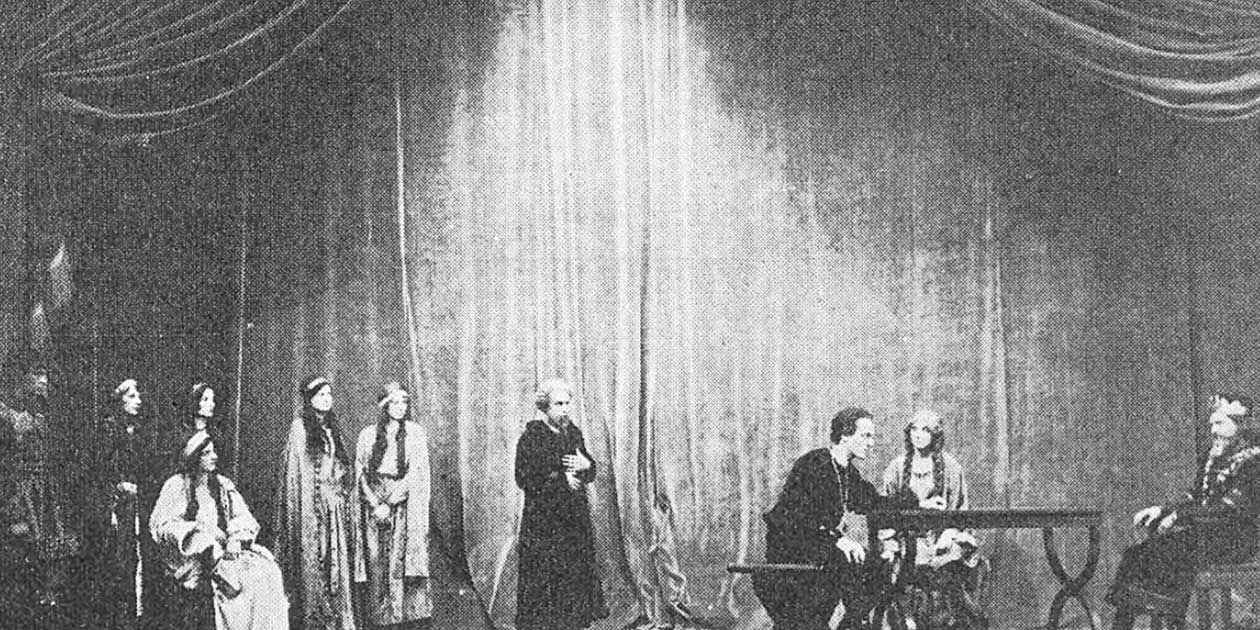 PHOTO: FREDERICK W. KENT COLLECTION OF PHOTOGRAPHS, UI LIBRARIES SPECIAL COLLECTIONS AND UNIVERSITY ARCHIVES
Even before the construction of the Theatre Building, University Theatre gave student thespians opportunities to showcase their talent, including through this 1929 presentation of Shakespeare's Hamlet.
PHOTO: FREDERICK W. KENT COLLECTION OF PHOTOGRAPHS, UI LIBRARIES SPECIAL COLLECTIONS AND UNIVERSITY ARCHIVES
Even before the construction of the Theatre Building, University Theatre gave student thespians opportunities to showcase their talent, including through this 1929 presentation of Shakespeare's Hamlet.
When Mabie arrived at Iowa to serve as acting head of the Department of Public Speaking in 1920, the university had no formal theater program. Drama clubs struggled to find performance venues after Iowa City's Englert Theatre raised its rental rates. In support of student thespians, Mabie lobbied Iowa administrators to equip Macbride Auditorium to become home to the new University Theatre.
Mabie advocated on a national level for regional theaters to "serve as community institutions," much as public libraries and municipal art galleries do. He partnered with New York drama critic Walter Pritchard Eaton to—as Eaton described it—"take the spoken drama to places where the professional theatre never reaches and to call out the creative energies of the people themselves."
In 1921, Mabie and Eaton formed the Little Theatre Circuit to tour towns across Iowa. Mabie also founded the Out-of-Doors Players that same year to perform summers in Iowa City, including on the Old Capitol, Quad, and City Park lawns. These outreach events helped set the stage for UI programs today such as Arts Share, which brings the arts to schools and communities across Iowa; the Darwin Turner Action Theatre that promotes understanding among people of different backgrounds; and the Summer Partnership in the Arts, which provides opportunities for students to work with professional guest artists to create and present new theatrical pieces.
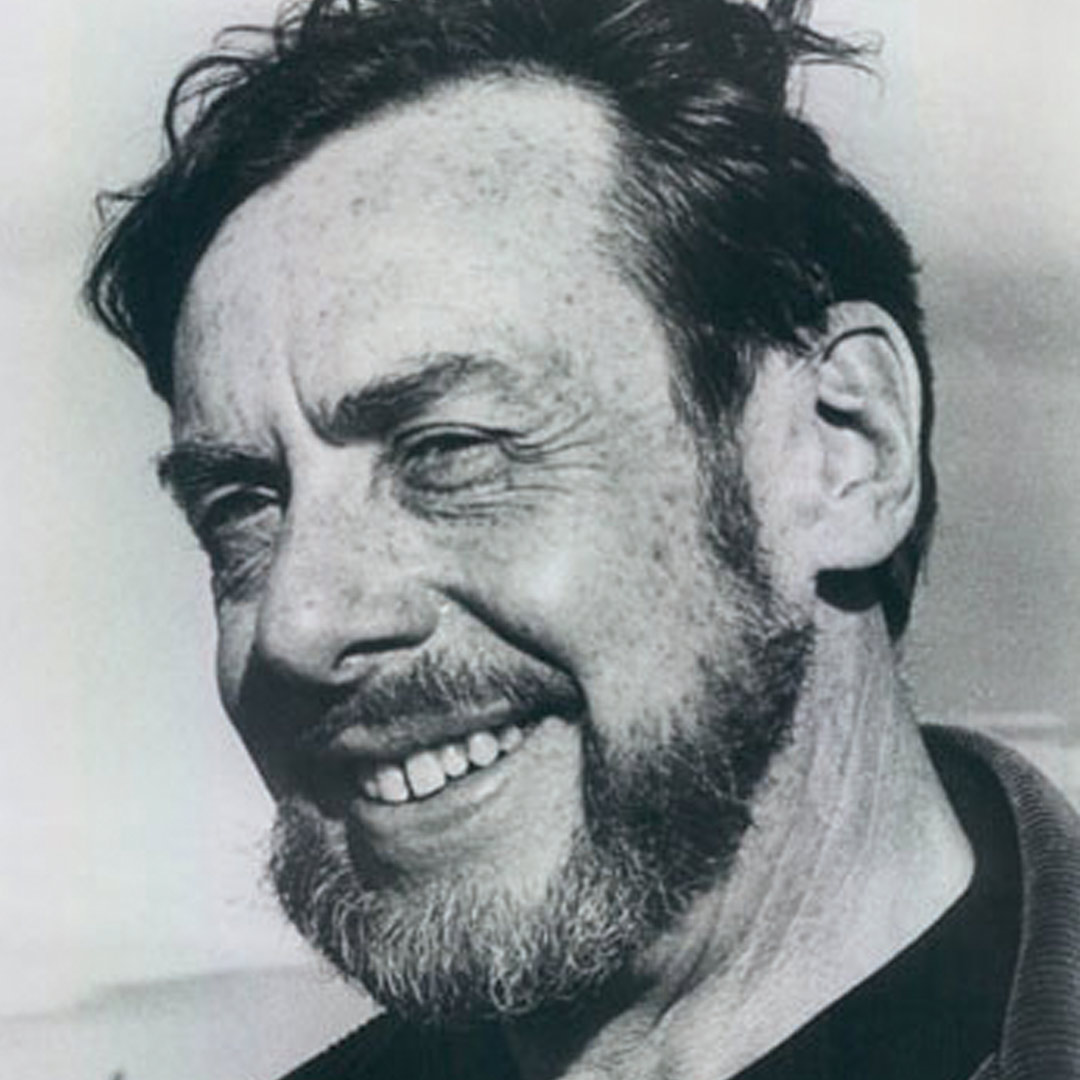 PHOTO: GOOGLE IMAGES
Iowa alumnus and TV
producer Norman Felton
PHOTO: GOOGLE IMAGES
Iowa alumnus and TV
producer Norman Felton
Campus arts programs flourished in 1922 when, under the leadership of President Walter Jessup (34LITTD) and Graduate College Dean Carl Seashore, Iowa became the first public university in the U.S. to accept creative works as theses for graduate degrees in the arts. E.P. Conkle (36PhD) became the first person at Iowa—and likely in the country—to receive a doctorate degree for his original plays. Richard Maibaum (31BA, 32MA), future screenwriter of the classic James Bond films, and Norman Felton (40BFA, 41MA), who would become a TV producer for The Man from U.N.C.L.E., were among the early theatre arts graduates who wrote plays as theses—reinforcing Iowa's reputation for theatrical innovation.
University leaders soon began to envision a campus for the arts on a former dumping ground on the west side of the Iowa River. Mabie pushed for the plan to include a theater building to house the budding drama program scattered across campus.
In October 1929, a stock market crash sunk the nation into the Great Depression. Although funding for the arts dried up during this time of widespread unemployment and economic hardship, Mabie never gave up on his dream. He successfully appealed twice to the Rockefeller Foundation for funds, and the university also received project money from the Public Works and Civil Works administrations created as part of President Franklin D. Roosevelt's New Deal.
The funding wasn't enough to cover Mabie's grand visions for the Theatre Building, but the university managed to cut enough non-essentials to begin construction in February 1934. Casualties included plans for a mural painted by UI art professor Grant Wood in the main auditorium.
Dedicated to the "creative spirit of the people of the prairies," the Theatre Building opened on Nov. 7, 1936, with the world premiere of Conkle's Broadway-bound play, Two Hundred Were Chosen. At its opening, the theater lacked many amenities that would be added over the next few years. In 1938, the auditorium walls received a finishing coat of plaster and paint, and drinking fountains installed the following year ended the department's reliance on bottled water deliveries. As late as 1939, patrons were asked to not flush toilets during performances because they had no valve silencers.
Despite funding setbacks, the Theatre Building was recognized as one of the best-equipped stages in the nation, and Iowa rose in its status as a destination university for the arts. In 1939, Life magazine predicted that in 20 years, Iowa would become a "cultural wonder of the world."
Mabie became a pioneer in the instruction of the dramatic arts as founding president of the American Educational Theatre Association and introduced some of the first university classes in radio, TV, and film. He also hired many talents whose names are still remembered throughout the university, including debate coach A. Craig Baird, communications studies professor Sam Becker (47BA, 49MA, 53PhD), speech pathologist Wendell Johnson (28BA, 29MA, 31PhD), UI interim president D.C. Spriestersbach (40MA, 48PhD), and UI theater mainstay David Thayer (55MA, 60PhD).
Mabie didn't live to see the addition to the Theatre Building that was outlined in his plans, but he set forth a vision that guided the department throughout its 100 years. Mabie's dream of a theatre arts department all under one roof was finally realized in 1985 with an addition that included two more state-of-the-art performance spaces. In 1973, the original 500-seat theater in the building Mabie helped construct 40 years earlier was named in his honor. "What other professors on this campus, no matter where, why, or how, built a building in the middle of the Depression?" former Iowa theatre arts professor Syd Spayde (34MA) once said. "It was his genius, his absolute genius."
Act Two - Alumni Leave a Legacy
The UI Department of Theatre Arts continues to influence the world of entertainment by preparing the next generation of artists for careers in an ever-evolving industry. Playwrights such as Lee Blessing (76MFA, 79MFA), Kirsten Greenidge (01MFA), and Samuel D. Hunter (07MFA) have explored new frontiers in theater, while other alumni such as Coach creator Barry Kemp (71BA), Rain Man producer Mark Johnson (73MA), and The West Wing producer Rick Cleveland (95MFA) have translated the skills they learned at Iowa into success in TV and film.
Many emerging talents are attracted to Iowa by the national prestige of the Iowa Playwrights Workshop. In 1971, under the leadership of Oscar Brownstein (63PhD), the department established the three-year MFA playwriting program, which was among the first of its kind in the country. "[The Iowa Playwrights Workshop] pioneered the idea that playwriting, like theater itself, is a discipline that can be studied and taught," says Art Borreca, Iowa associate professor, co-head of the Iowa Playwrights Workshop, and co-head of dramaturgy. "It has always moved with the times, creating one of the first new play festivals, adapting to professional methods of new play development, and supporting young writers in the early phase of their careers."
 PHOTO: JESSICA FALLON GORDON PHOTOGRAPHY
Keith Josef Adkins
PHOTO: JESSICA FALLON GORDON PHOTOGRAPHY
Keith Josef Adkins
One of these young writers was Keith Josef Adkins (95MFA), a leading advocate for diversity in theater who has two works featured in the department's centennial season. Adkins remembers pausing between classes to study the portraits of distinguished alumni that line the halls of the Theatre Building. Now his portrait hangs among this who's who of Iowa theater that includes Tony, Emmy, Oscar, and Pulitzer Prize recipients.
Adkins, who taught fourth grade in Oakland, California, before enrolling in the Iowa Playwrights Workshop, became interested in theater through the spoken word movement. He came to Iowa on the recommendation of Billie Allen, one of the first Black actresses to appear on TV and stage in the U.S. Allen directed some of Adkins' plays in New York and connected him with her friend Lavonne Mueller, who was then director of the Iowa Playwrights Workshop.
Although Adkins experienced culture shock leaving the vibrant multicultural and political world of the Bay Area, he soon thrived under the support of his theatre arts professors, who encouraged him to nurture his own voice rather than copy coastal theater trends. "I could tell it was an encouraging place to write and be filled," says Adkins.
Adkins contributed to the flourishing writing culture in Iowa City, finding inspiration from fellow UI artists in the world-renowned Iowa Writers' Workshop, International Writing Program, and Nonfiction Writing Program. "I really felt like I was home," he says.
Iowa provided the environment Adkins needed to experiment with his writing style and find authenticity in his storytelling. He credits his transformation as a playwright to seeing the works of UI theatre arts guest artist María Irene Fornés, a Cuban American avant-garde playwright, and classmate Naomi Wallace (86MFA, 93MFA), an Arts and Letters Award in Literature winner known for exploring sociopolitical themes. Inspired by the artists he encountered at Iowa, Adkins wrote a play as his graduate thesis that landed him an agent in New York.
Today, the UI alumnus is shaping the future of theater as the artistic director and co-founder of the New Black Fest. The Brooklyn-based theater movement helps showcase Black voices across the African diaspora to tackle the lack of diversity and authentic representation in traditional theater. Over the past 10 years, the festival has featured more than 150 Black playwrights, as well as numerous Black actors and directors from around the world. "I want to hear all of those voices, because it's really important to change the game by changing the way we see each other," says Adkins.
 PHOTO COURTESY TELEVISION ACADEMY
In 2000, Aaron Sorkin and Iowa Playwrights Workshop
alumnus Rick Cleveland accept an Emmy for Best Writing
for a Drama Series for their work on The West Wing.
PHOTO COURTESY TELEVISION ACADEMY
In 2000, Aaron Sorkin and Iowa Playwrights Workshop
alumnus Rick Cleveland accept an Emmy for Best Writing
for a Drama Series for their work on The West Wing.
Adkins also has made his mark in TV, writing for shows such as the CW's Girlfriends, CBS's The Good Fight, and ABC's For the People. He recently sold an original TV project to Netflix through Regina King's production company, Royal Ties. He's also working on a Netflix show with Buffy the Vampire Slayer executive producer Marti Noxon, as well as a science fiction project with J.J. Abrams' production company, Bad Robot. "Theater is very much a community experience for me where I've built my tribe of artists and we tell stories together," says Adkins, "but I also equally enjoy telling larger stories through TV and film where a much larger audience is going to experience it."
Adkins now joins the growing network of professional theater alumni and guest artists who help enrich student learning at Iowa, whether informally or through programs such as the Partnership in the Arts and the Iowa New Play Festival. Students are gaining hands-on experience this centennial season by producing and performing two of Adkins' plays at Iowa. 6 by 6: Collected Perspectives on Social Justice, a series of 10-minute plays from Black alumni playwrights (including Adkins) opened the season to emphasize the department's commitment to elevate diverse voices, create space for dialogue about race, and celebrate the diversity of students and alumni in the Hawkeye family. In spring 2021, the department will present Adkins' The People Before the Park about a predominantly Black village razed to create Central Park. "It's important to understand the complexity of history and how no one's really immune from participating in the marginalization of others," Adkins says about the show. "I do hope audiences find an interest and compassion for those people who sacrificed their homes so we can have a beautiful park."
Act Three - Students Chart the Future
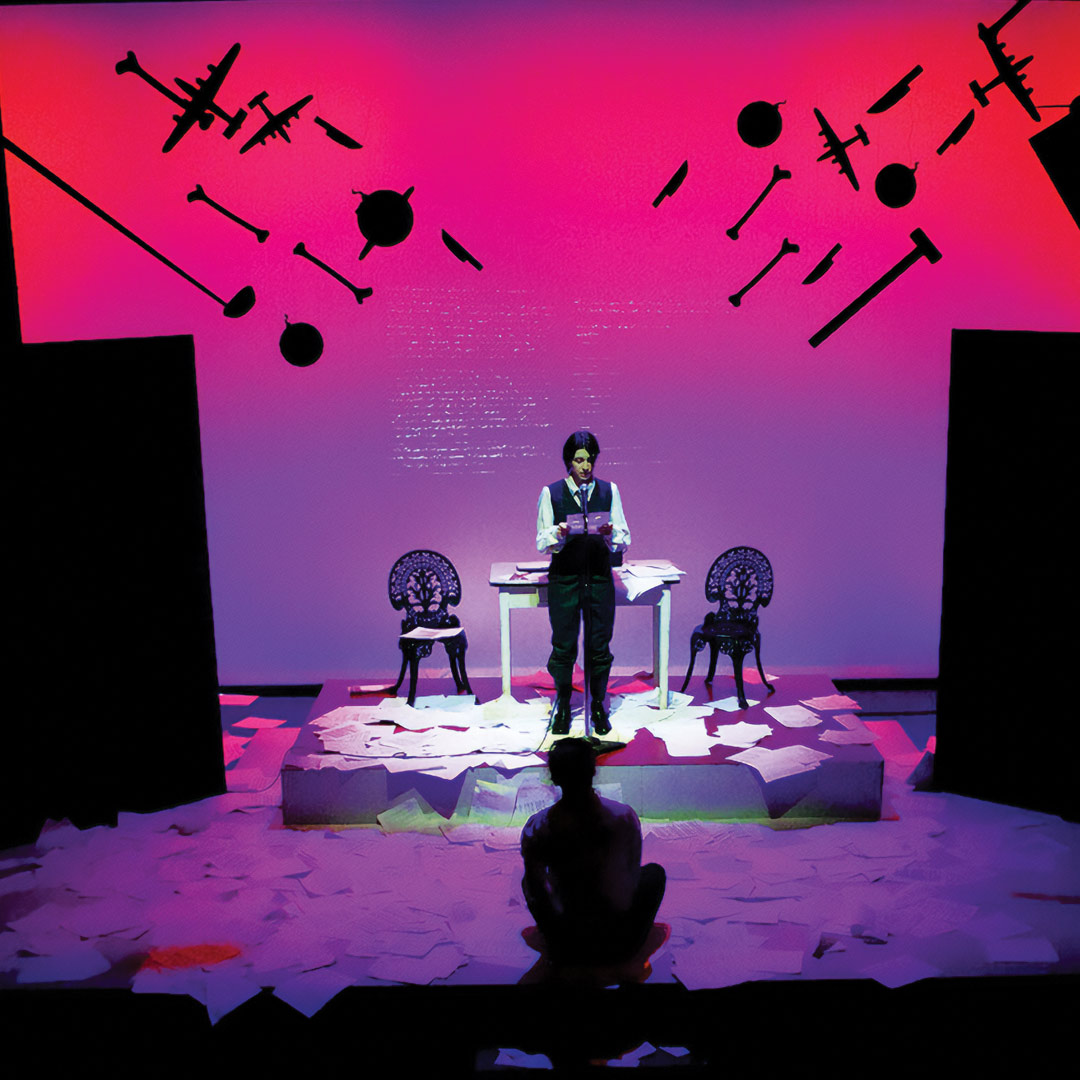 PHOTO: R. ERIC STONE
UI theatre arts senior Jivani Rodriguez stars as aviator Wilbur
Wright in a student-written and directed production of Merrily in fall 2019.
PHOTO: R. ERIC STONE
UI theatre arts senior Jivani Rodriguez stars as aviator Wilbur
Wright in a student-written and directed production of Merrily in fall 2019.
Jivani Rodriguez describes the UI Department of Theatre Arts as a family. It's a place where she says she's grown not only as an actor and playwright, but also as a person. "It feels like there's something for everyone, and the teachers really care about their students, want them to succeed, and have a great depth of knowledge," says the senior from Fairfield, Iowa.
These days, the Iowa family has banded together to face an unprecedented challenge. Students are learning how to perform theater in a world of social distancing and masks. Rodriguez longs for the return of those "intoxicating moments of spontaneous connection and newness" that happen every night on stage."
Genevieve Eckelaert, a senior from Appleton, Wisconsin, agrees that it's a strange time for theater. Still, she sees this as an important moment for theater to be a "burning light" that draws attention to pressing issues such as racial equity and health care. "Theater is such an incredible medium that's not only entertaining, but also a raw and real way to connect with individuals," she says. "It's really important that we use this incredible tool to improve our future."
To that end, several student teams shed light this season on the personal experiences of health care professionals, first responders, custodians, grocery store clerks, and other essential workers during COVID-19. Directed by MacVey, Essential Workers: A Portrait is based on the BBC show Portrait Artist of the Year, where artists paint portraits of people while they tell their stories. Student playwrights took the process a step further by using those stories to inspire short plays.
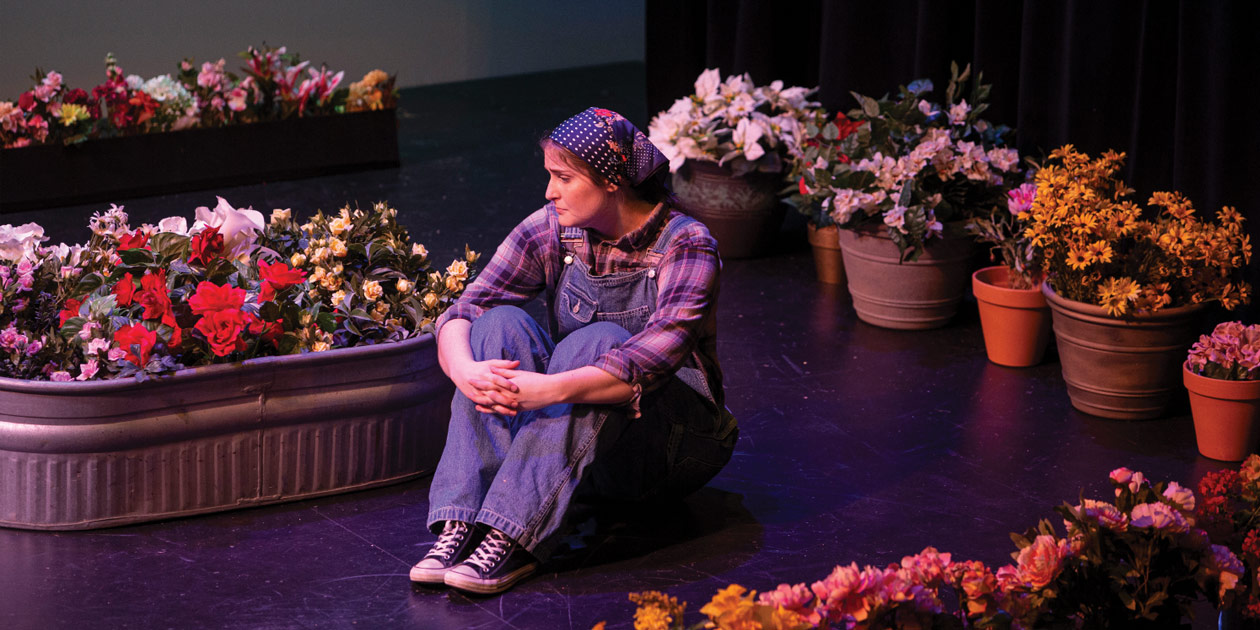 PHOTO: JAKE MAISH/DAILY IOWAN
UI student Paige
Harken acts in Home Garden,
a play written by undergrad
Jivani Rodriguez about a
couple struggling with the
decision to have children.
PHOTO: JAKE MAISH/DAILY IOWAN
UI student Paige
Harken acts in Home Garden,
a play written by undergrad
Jivani Rodriguez about a
couple struggling with the
decision to have children.
Eckelaert says such chances to work closely with artists across disciplines, including with graduate student playwrights, are rarely found elsewhere. With both undergraduate and graduate programs that cover nearly every aspect of theater, the department offers students a liberal arts education that encourages them to explore their interests. Although Eckelaert is focused on acting and stage management, she's also enjoyed taking classes outside those areas, which wouldn't be offered in a specialized program. She's currently taking a voiceover course that has boosted her confidence about finding work during the pandemic. "I feel reassured at Iowa, because they do so much to prepare you for the real world and give you a lot of different opportunities," says Eckelaert.
The range of learning opportunities available to students has only multiplied since the early days of the department, when Iowa became an important steppingstone for Milwaukee native Jerry Silberman on his path to becoming world-renowned actor Gene Wilder. "As we look to the future, we will continue the legacy of those who came before, while we embrace new digital technologies and explore the ever-changing way stories are told," says Easley, the department head. "Our focus will also be on nurturing new voices, expanding community outreach, and making systemic changes to become a more equitable organization and a model for the theatre arts profession."
The department already has made great strides toward these goals. Students can learn about motion capture equipment and other cutting-edge technology through a new digital media program. A reading series invites diverse voices from across campus to share their work, exposing students to different perspectives that may enhance their crafts. The archives of Theatre Without Borders, an international research collaborative, will be housed at the UI Libraries this spring, providing valuable resources to bolster the study of theater for social justice and community engagement.
"Now, as before, it remains our goal to find what comes next and build it ourselves," says MacVey, who has watched the department grow over the past three decades. "I'm confident that our next 100 years will be as rich as the last."

